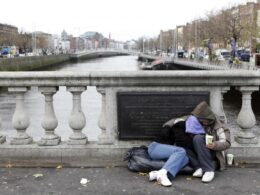Finn McKenna interviewed carer and member of Spina Bifida Hydrocephalus Paediatric Advocacy Group, Stephen Morrison, about the fight for disability justice and opposing this ableist government.
FMcK: Simon Harris has been anointed leader of FG and Taoiseach this week. Why has he earned the ire of parents of children with scoliosis and spina bifida?
Stephen M: I think that Simon Harris’ anointment to Taoiseach has not only frustrated but has angered parents of children with spina bifida and scoliosis and I suppose carers across the country and parents of children with disabilities. In 2017 he made a very specific promise after he was shamed by a documentary that was done by Primetime. He made a very specific promise because the next day the country was outraged by what they had seen. In the documentary, he stated that no child will wait longer than four months for scoliosis care.
Now, since that time, things have gotten a lot worse to the point now that no children with spina bifida have been receiving surgeries since September 2023. I think Simon Harris, this idea that he was Minister for Health at one point but is no longer, that suddenly his involvement in it doesn’t exist anymore so he has just walked away from that job and there’s no accountability for the promises or the things that he implemented while he was Minister for Health. I think that making such a bold statement like that, that this crisis was going to be solved, and we are seven years on. Lists are bigger, the children are left longer, with some children’s condition becoming inoperable, like my own son – he can’t breathe whenever he gets a viral illness, so I think those kind of promises with no actual political motivation to fix them, I think shows what kind of Taoiseach he’s going to be. We don’t need a Taoiseach that’s able to do spin, we need a Taoiseach that’s able to implement real change with political pressure, to actually do something about it. Be it insourcing staff, be it sending children abroad, we need something stronger.
FMcK: Tell us about the government’s “Green Paper on Disability Reform”? Why are disability rights activists fighting to oppose it?
Stephen M: The Green Paper is a tried and tested Tory policy that was done in the UK. Basically, it’s to categorise people’s disability – so it’s a scale system, there’s three scales for it. Depending on how severe your disability is, you’ll fall into a general category of financial support. I don’t know the exact numbers, but I think the first level was around 220 euro. The next level was about 230 and the highest was 240, which is quite interesting because during the pandemic they rolled out the PUP payment of 350 euro and at the time the government was actually quoted as saying that no person could live on anything under that. It’s interesting that the expect carers and people with disabilities to keep rolling on with such a poor payment. It’s a Tory policy that was put in place in the UK and it’s a disaster. I believe that the UN disability rights organsiation have actually reported the UK because of their implementation of this. There have been cases, with one specific one, where a young gentleman in the UK had his payment reduced and h subsequently couldn’t feed himself, he couldn’t heat his house and he died of starvation. And when he was found, he was found by the bailiffs who had come to evict him from his homes. There’s a massive worry across people living with disabilities in Ireland with what the Green Paper represents and what has happened. It’s ableist in its wording anyway, to start categorising people with disabilities and telling them how they can and should work.
People with disabilities are fighting this because it doesn’t really do anything for them. It almost puts the onus on them to actually go out and work when not focusing on the employers and making things more accessible for people with disabilities. We’ve one of the worst employments rates for people with disabilities in this country and that is not due to people with disabilities not wanting to work. It’s the case that the system, the surrounding buildings aren’t accessible. People with disabilities might need specific toileting needs. There’s no onus on employers to make their buildings and workplaces accessible. So I think realistically we need to be focusing on things like that before we target the vulnerable people in our society.
FMcK: What do you think are the measures that disability rights activists are fighting for? You touched upon it a minute ago, but can you go into it a bit further?
Stephen M: The whole sector of disability in Ireland is broken at the moment. There’s not one part pf it that’s working well, be it housing, health, early intervention services for children with autism and other disabilities be it school places, be it transport, be it our current disability laws in relation to building access. You know we have one of the busiest streets in the country, Temple Bar, and the yare refusing to change the surface as it’s protected. Or even to try and implement something that would allow people with disabilities to use it.
I think people with disabilities now want legal rights, proper legal rights. Things aren’t going to change unless the government is legally obliged to do these things, which they aren’t at the moment. There’s no legal obligation to provide for children with disabilities or adults living with disabilities with specific healthcare needs, so I think we really do need to start looking at proper well-structured disability Bill for people living with disabilities. The access for basic fundamentals, it’s almost impossible to get that access. I know with my own situation with early intervention services it was non-existent.
FMcK: On that point, in terms of such a Bill, how do you think such a Bill could be brought into existence? Do you think struggle from below is necessary?
Stephen M: Yeah absolutely. Whatever movement happens, because there definitely is a movement happening within the disability and caring community, it needs to be disability-led. People with disabilities need to be at the forefront of creating a Bill of Rights for people with disabilities and it needs to be what their wants and needs are. I think that they have been cast aside for far too long now by Irish society. It’s time now for all public representatives, be it councillors, be it people within the health system, the housing system you know. They need to bring people with disabilities around the table for talks and what way we’re going to move forward. The disability and care community is 800,000 strong in relation to our voting base. There are 1.3 million people in Ireland who either have a disability or are a carer. We should technically be the largest lobbying group in the country. Unfortunately, we haven’t organised well, but that is changing now. We’ve started to meet politicians, and we’ve got many advocacy groups joining forces to basically take on the Establishment and get people their basic human rights.












